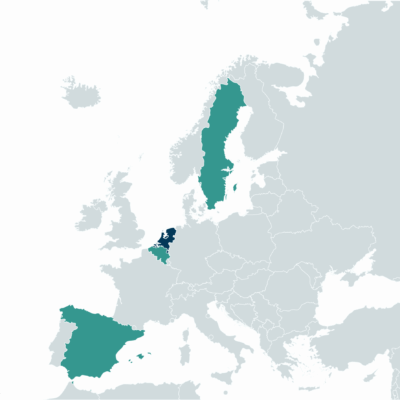emBrace- Reconciling Food Systems Sustainability and Biodiversity Conservation in Multifunctional Protected Areas
Call
Duration
01/04/2025 – 31/03/2028
Total grant
Approx. 1.3 mil. €
More information
Mario Torralba
m.torralbaviorreta@vu.nl
Partners of the project
- Institute for Environmental Studies, Vrije Universiteit Amsterdam, Amsterdam, Netherlands
- Eigen Vermogen van het Instituut voor Natuur- en Bosonderzoek, Brussel, Belgium
- Department of Geography, University of Namur, Namur, Belgium
- Laboratory of Sustainability, Resilience and Governance of Socio-Ecological Systems, University of Almería, Almería, Spain
- Stockholm Resilience Centre, Stockholm University, Stockholm, Sweden
- Department of Sociology, University of Antwerp, Antwerp, Belgium

Context
Europe’s rural landscapes are currently on an unsustainable path, shaped by unequal social and environmental dynamics that harm both biodiversity and human well-being. To address this, we need a major shift in European food systems toward more sustainable and localized models. These models should prioritize agroecological practices, fair value chains, and responsible consumption. At the same time, we must adopt inclusive conservation approaches to stop biodiversity loss, especially as traditional conservation methods often fall short, failing to protect biodiversity and disconnecting people from nature.
In this context, emBrace will support the development of multifunctional protected areas designed as NbS to bring together biodiversity protection and sustainable food systems. These NbS, rooted in principles of environmental justice and inclusivity, will aim to strengthen the relationship between people and nature. By doing so, they can inspire landscape stewardship actions that deliver mutual benefits for biodiversity conservation and sustainable food systems.
Main objectives
Through systematic data collection in emBrace’s four case studies, combined with social learning, knowledge co-production, action-oriented research, cross-cultural learning, and knowledge synthesis, emBrace aims to address key knowledge gaps: (1) How collaboration within landscape coalitions can help resolve trade-offs and conflicts among different stakeholders in multifunctional protected areas; (2) What are the potential benefits of integrating food systems and biodiversity protection within multifunctional landscapes; and (3) What are the effective ways to share and amplify successful approaches, driving meaningful and transformative change.
Main activities
emBrace will implement an action-oriented research programme where academic partners work closely with non-academic actors to co-produce results. This collaboration is facilitated through Knowledge Hubs established early in the project in the four emBrace’s case studies (The Zwinstreek in Flanders, the Alpujarras in South Spain, Coeur de Condroz in Belgium, and Kristianstads Vattenrike in Sweden). emBrace will begin with participatory visioning workshops, using the Nature Futures framework to create shared visions of desirable futures. These workshops will set the stage for all project activities, which combine well-established methods with innovative techniques to promote social learning. emBrace’s findings will play an important role in supporting the European Green Deal by offering insights into how its components, such as the Farm to Fork Strategy and the Biodiversity Strategy for 2030, can be better integrated. This is possible thanks to the interdisciplinary expertise of emBrace’s partners, whose diverse skills complement one another, and the variety of case studies involved. By using real-world labs, emBrace not only tests scientifically relevant theories but also creates opportunities for critical reflection and deeper insights, paving the way for meaningful progress.

